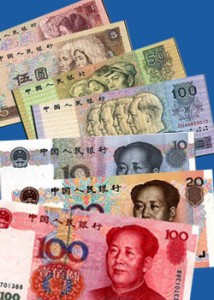Tuesday
Aug312010
China Economy Weekly: Southeast Asia’s Robust Trade; High-Speed Railways; China Becomes Hydro Superpower
 Tuesday, August 31, 2010 at 8:58
Tuesday, August 31, 2010 at 8:58  China-ASEAN Trade Rises: Trade value between China and the Association of Southeast Asian Nations (ASEAN) rose 49.6% year-on-year in the first seven months to $161 billion, with ASEAN enjoying a surplus of $7.54 billion.
China-ASEAN Trade Rises: Trade value between China and the Association of Southeast Asian Nations (ASEAN) rose 49.6% year-on-year in the first seven months to $161 billion, with ASEAN enjoying a surplus of $7.54 billion.High-speed Railways in South China to: China will complete 5,000 kilometers of high-speed railways in the mainland's southern region by 2012 to accelerate ieconomic integration with Hong Kong and Macao.
The railways, to be laid in the sprawling pan-Pearl Delta region of eight provinces and an autonomous region of the mainland, will account for nearly 40& of the country' total in the next three years.
Chinese Coal Mines: The Chinese Government has stressed the need for the country's coal mine enterprises to continue with mergers and acquisitions for the healthy development of the industry.
The statement was issued following an executive meeting of China's State Council, chaired by Premier Wen Jiabao.
The government will also introduce preferential measures on finance and taxation to support the upgrade of safety technologies of the merged enterprises, and it said it will protect workers and investors' rights by law during the merger and acquisition process.
Government Expenditure up 134%: China's government expenditure surged 134.3% in the first seven months of 2010 as compensation for land purchases grew rapidly.
From January to July, the spending was 1.32 trillion yuan ($194 billion). Total revenue reached 1.8 trillion yuan, up 146%.
Chinese Economy to Stabilise?: The Chinese economy will start to stabilise in the fourth quarter after the recent marked slowdown due to government measures, but it might face risks next year as external demand weakens, Ben Simpfendorfer, chief China economist at the Royal Bank of Scotland (RBS) has.
China's purchasing managers' index (PMI), a leading indicator of economic health, has fallen for two consecutive months to 51.2% in July, barely above the expansive baseline of 50%.
State Enterprises to Hire Overseas Managers: More than a dozen State-owned enterprises will hire new managers by the end of the year after a worldwide recruitment campaign, the States Assets Supervision and Administration Commission (SASAC) announced.
Four general managers and eight assistant managers will join during the eighth and largest global hiring programme.
The new hires are part of the nation's "1,000-talent" initiative offering high salaries and attractive funding to overseas employees who want to work in China.
China Becomes Hydro Superpower: As all generating units began running at Xiaowan Hydropower Station in the southwestern Yunnan province, China's capacity became the world's largest.
The new 700,000 kilowatt-unit at Xiaowan sent China's installed hydropower capacity just above 200 million kilowatts and marked the completion of the 4.2 million-kilowatt project, China's second-largest hydropower plant after the Three Gorges.
With a total investment of 40 billion yuan ($5.86 billion), Xiaowan can produce 19 billion kWh of electricity every year.
tagged  ASEAN,
ASEAN,  Association of Southeast Asian Nations,
Association of Southeast Asian Nations,  Ben Simpfendorfer,
Ben Simpfendorfer,  Carbon emissions,
Carbon emissions,  Chen Deming,
Chen Deming,  China Construction Bank Corp,
China Construction Bank Corp,  China's State Council,
China's State Council,  Coal mine industry,
Coal mine industry,  Copenhagen Conference,
Copenhagen Conference,  Foxconn,
Foxconn,  Government funds expenditure,
Government funds expenditure,  High-speed railways,
High-speed railways,  Hong Kong,
Hong Kong,  Li Keqiang,
Li Keqiang,  Macao,
Macao,  PMI,
PMI,  Pan Pearl Delta Regional Cooperation and Development Forum,
Pan Pearl Delta Regional Cooperation and Development Forum,  Pearl River Delta,
Pearl River Delta,  Purchasing managers' index,
Purchasing managers' index,  Royal Bank of Scotland,
Royal Bank of Scotland,  Shenzhen,
Shenzhen,  State-owned enterprise,
State-owned enterprise,  Taiwan,
Taiwan,  Three Gorges,
Three Gorges,  Vietnam,
Vietnam,  Wen Jiabao,
Wen Jiabao,  Xiaowan Hydropower Station in
Xiaowan Hydropower Station in  China & East Asia
China & East Asia
 ASEAN,
ASEAN,  Association of Southeast Asian Nations,
Association of Southeast Asian Nations,  Ben Simpfendorfer,
Ben Simpfendorfer,  Carbon emissions,
Carbon emissions,  Chen Deming,
Chen Deming,  China Construction Bank Corp,
China Construction Bank Corp,  China's State Council,
China's State Council,  Coal mine industry,
Coal mine industry,  Copenhagen Conference,
Copenhagen Conference,  Foxconn,
Foxconn,  Government funds expenditure,
Government funds expenditure,  High-speed railways,
High-speed railways,  Hong Kong,
Hong Kong,  Li Keqiang,
Li Keqiang,  Macao,
Macao,  PMI,
PMI,  Pan Pearl Delta Regional Cooperation and Development Forum,
Pan Pearl Delta Regional Cooperation and Development Forum,  Pearl River Delta,
Pearl River Delta,  Purchasing managers' index,
Purchasing managers' index,  Royal Bank of Scotland,
Royal Bank of Scotland,  Shenzhen,
Shenzhen,  State-owned enterprise,
State-owned enterprise,  Taiwan,
Taiwan,  Three Gorges,
Three Gorges,  Vietnam,
Vietnam,  Wen Jiabao,
Wen Jiabao,  Xiaowan Hydropower Station in
Xiaowan Hydropower Station in  China & East Asia
China & East Asia 

